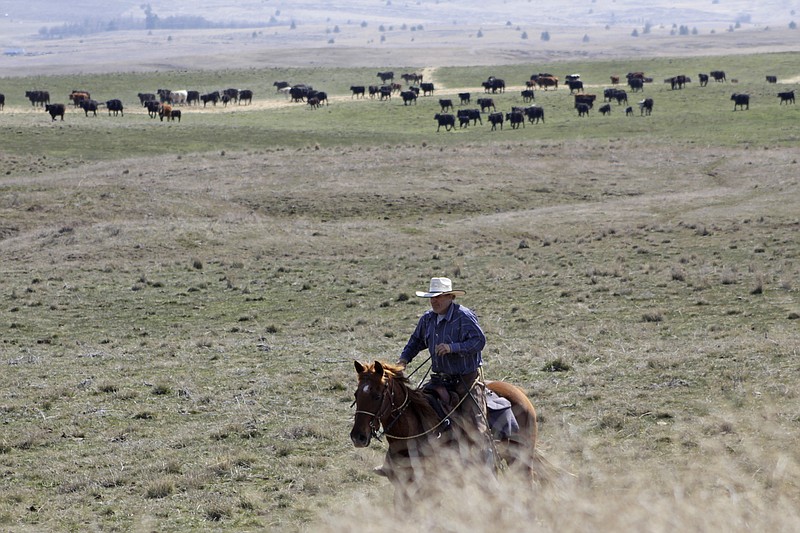[<a href="https://www.newstribune.com/news/health/" style="color:#33AEFF">access the News Tribune Health section</a>]
As the coronavirus rages across the United States, mainly in large urban areas, more than a third of U.S. counties have yet to report a single positive test result for COVID-19 infections, an analysis by the Associated Press shows.
Data compiled by Johns Hopkins University shows 1,297 counties have no confirmed cases of COVID-19 out of 3,142 counties nationwide. The number of counties without a positive coronavirus case has declined rapidly, dropping from more than half as the AP was preparing to publish. Of the counties without positive tests, 85 percent are in rural areas - from predominantly white communities in Appalachia and the Great Plains to majority Hispanic and Native American stretches of the American Southwest - that generally have less everyday contact between people that can help transmit the virus.
At the same time, counties with zero positive tests for COVID-19 have a higher median age and higher proportion of people older than 60 - the most vulnerable to severe effects of the virus - and far fewer intensive care beds should they fall sick. Median household income is lower, too, potentially limiting health care options.
The demographics of these counties hold major implications as the Trump administration develops guidelines to rate counties by risk of the virus spreading, empowering local officials to revise social distancing orders that have sent much of the U.S. economy into free fall. President Donald Trump on Sunday extended the country's voluntary national shutdown for a month, significantly changing his tone on the coronavirus pandemic.
Experts in infectious disease see an opportunity in slowing the spread of coronavirus in remote areas of the country that benefit from "natural" social distancing and isolation, if initial cases are detected and quarantined aggressively. That can buy rural health care networks time to provide robust care and reduce mortality.
However, they also worry sporadic testing for coronavirus could be masking outbreaks that - left unattended - might overwhelm rural health networks.
"They'll be later to get the infection, they'll be later to have their epidemics," said Christine K. Johnson, a professor of epidemiology at the University of California, Davis. "But I don't think they're going to be protected because there's nowhere in the U.S. that's isolated."
Counties that have zero confirmed COVID-19 cases could raise a red flag about inadequate testing, she said.
"I hope the zeros are really zeros - I worry that they're not doing enough testing in those regions because they're not thinking they're at risk," she said.
In New Mexico, a state with 2 million residents spanning an area the size of Italy, Democratic Gov. Michelle Lujan Grisham has moved aggressively to contain the coronavirus' spread with a statewide school shutdown and prohibition on most gatherings of more than five people.
Nearly half of the state's 33 counties are free of any positive coronavirus cases. New Mexico is among the top five states in coronavirus testing per capita, though some virus-free counties aren't yet equipped with specialized testing sites beyond samplings by a handful of doctor offices.
Torrance County Manager Wayne Johnson said plans are being made for the first three dedicated COVID-19 testing sites in the high-desert county of 15,000 residents that spans an area three times the size of Rhode Island.
A statewide stay-at-home order is keeping many residents from commuting to jobs in adjacent Bernalillo County, the epicenter of the state's COVID-19 infections, with 93 confirmed cases out of a state government tally of 208 as of Saturday night.
"We don't have any test sites open, and part of that is that we don't have any needs for the test yet," Johnson said. Still, Johnson said he worries an outbreak could overwhelm the county's sole medical clinic and an all-volunteer corps of emergency medical technicians.
The states first of two coronavirus-related deaths occurred March 22 within a southern oil-producing region in Eddy County, where two other positive tests have surfaced. A man in his late-70s died shortly after arriving at a hospital in Artesia, and tested positive postmortem. He had previously visited two health clinics, and at the hospital five staff were quarantined for possible exposure even though they wore face masks.
State Deputy Epidemiologist Chad Smelser said health officials have continued to painstakingly retrace the steps of infected patients and notify people who came into contact with them. There are dozens of connections per infection on average.
State health officials said it is unclear how many people have been tested for coronavirus in each county.
Medical experts said uneven testing patterns across the country make it difficult to gauge whether remote areas are really better off.
He said he fears for homeless populations and undocumented migrants.
Complaints that testing is not readily available extend to the crossroads town of Crossett in southern Arkansas, where surrounding Ashley County has no confirmed coronavirus cases.
Disabled veteran Marty Zollman, 42, of Crossett, said his wife, a clothing store clerk, and teenage daughter sought coronavirus testing this week for fever and flu-like symptoms at a local health clinic and were turned away.
"We might be contagious, but no one will test her," Zollman said of his wife, Janet, who was awaiting surgery for breast cancer. "They keep turning her down. They don't have a source of testing."
He lashed out at Trump for indicating that testing is readily available. "Now it's time for me to call his bluff. If he's got the equipment he's got to provide it," Zollman said.

